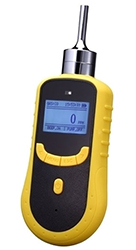Precautions for Using a Gas Detector
Gas detector is a kind of instrument for gas leakage concentration detection. It is mainly divided into portable gas detector, handheld gas detector and fixed gas detector, which detects gas species present in the environment with the gas sensor. The gas sensor is used to detect the composition and content of the gas. However, what precautions should be noted when using a gas detector?
Detection interference between various gas detectors
In general, each sensor corresponds to a specific detection gas. Therefore, when choosing a gas detector, it is necessary to understand the detection interference of other gases on the sensor as much as possible to ensure its accurate detection of a specific gas.
Calibration and testing frequently
 All kinds of gas detectors are measured by a comparative method. The gas detector is first calibrated with a zero gas and a standard concentration of gas, and the standard curve is obtained and stored in it. During the measurement, the gas detector will measure the gas to be measured. The electrical signal generated by the concentration is compared with the electrical signal of the standard concentration, and the accurate gas concentration value is calculated. Therefore, regular calibration of a gas detector is an essential work to ensure accurate measurement. It should be noted that many gas detectors can replace the detection sensor at present, but this does not mean that a gas detector can be equipped with different detector probes at any time. Whenever a probe is replaced, in addition to a certain sensor activation time, the gas detector must be recalibrated. In addition, it is recommended to perform response detection on the standard gas used in the gas detector to ensure that it truly plays a protective role.
All kinds of gas detectors are measured by a comparative method. The gas detector is first calibrated with a zero gas and a standard concentration of gas, and the standard curve is obtained and stored in it. During the measurement, the gas detector will measure the gas to be measured. The electrical signal generated by the concentration is compared with the electrical signal of the standard concentration, and the accurate gas concentration value is calculated. Therefore, regular calibration of a gas detector is an essential work to ensure accurate measurement. It should be noted that many gas detectors can replace the detection sensor at present, but this does not mean that a gas detector can be equipped with different detector probes at any time. Whenever a probe is replaced, in addition to a certain sensor activation time, the gas detector must be recalibrated. In addition, it is recommended to perform response detection on the standard gas used in the gas detector to ensure that it truly plays a protective role.
Concentration measurement range
All kinds of gas detectors have fixed detection range. Only when the gas detector completes the measurement within its measurement range can it be ensured that it can accurately measure. If the measurement is performed outside the measurement range for a long time, it may cause permanent damage to the sensor. The toxic gas detector will also cause damage if it is used for a long time at a higher concentration. Therefore, if the fixed gas detector sends out an over-limit signal during use, the measurement circuit should be closed immediately to ensure the safety of the sensor.
Sensor lifespan
Gas sensors have a certain service life. Generally speaking, in gas sensors, LEL sensors have a longer lifespan and can generally be used for about three years. Photoionization detectors have a lifespan of four years or more. Electrochemical specific gas sensors have a relatively short lifespan, generally in one to two years. The lifespan of the oxygen sensor of the gas detector is about one year. The lifespan of the sensor depends on the drying of the electrolyte, so if it is not used for a long time, sealing it in a lower temperature environment can prolong the service life to a certain extent. Due to the relatively large size of fixed gas detectors, its sensor lifespan is also longer. Therefore, it is necessary to test the sensor at any time, use it within the validity period of the sensor as much as possible, and replace it in time once it fails.

